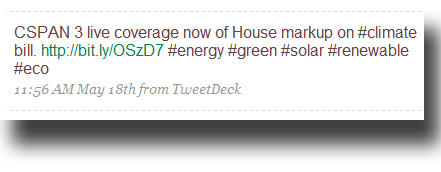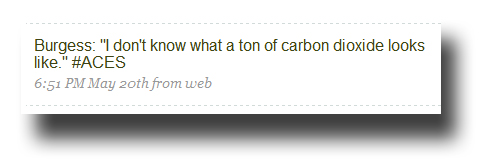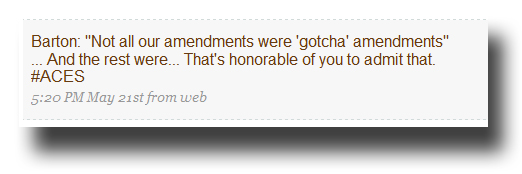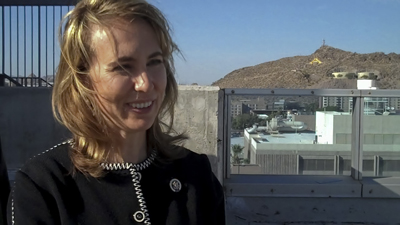Above is raw video I shot in October 2009 while accompanying Congresswoman Gabrielle Giffords on a tour of new solar installations at Arizona State University in Tempe, Arizona. I never posted (or edited) this segment, but decided to put it up now, because it shows an important aspect of what makes Gabby unique. She’s tweeting about the new solar panels on a rooftop we just saw and talks about why twitter is important to her — because it allows her to communicate directly with her constituents, unedited and unsupervised by staff.
Tag Archives: Twitter
Solar Tweeting | “Are You Listening, Arizona Legislature?”
The Anti-Solar Debacle
HB 2701 — Arizona newspapers editorialized against it. “Lawmakers, don’t clip solar’s wings,” was the Arizona Republic‘s headline. Now, the Arizona Star advises, “The bill should be killed, and quickly.”
The Phoenix Sun has been critical of the bill, too. Why, we wondered, would the state legislature go from being an advocate of our growing solar industry to trying to squash it like a bug?
There are lots of theories, and more information on this dreadful bill is forthcoming.
Today, we’re giving a new chorus of voices a chance to be heard.
Stupefaction in 140 characters
Twitter campaigns for or against legislation aren’t exactly new. Ever since HB 2701 was announced, however, the “tweets” against it have grown with no discernible coordination. In our experience, it’s pretty remarkable to have this kind of outpouring on a state issue. Reading the tweets as they came in, it became clear that with this one bill, the legislature was turning Arizona into a national joke. (After the Vermont Senate voted against keeping a leaking nuclear power plant open, a friend tweeted me asking if maybe Vermont would be willing to pack up their 37-year-old nuke plant and send it to Arizona — where we clearly appreciate such things. Grrrrrr.)
The Arizona state legislature hasn’t shown much capacity for common sense lately. Still, we hope it hasn’t forgotten how to listen. Voters have a way of dealing with tone-deaf politicians: elections.
#ACES | Tweeting the climate bill, 140 characters @ a time
Three journalists (and one activist) share the agonies and ecstasies of tweeting the House climate bill’s 40-hour shlep through committee
HR 2454, “the American Clean Energy and Security Act of 2009,” is historic for reasons large and small. It’s the first comprehensive US legislation to tackle climate change. Committee Chairman Henry Waxman (D-CA) was probably correct when he suggested that last night’s decision to approve the bill was the single most important vote committee members would cast in this Congress.
And then there is the smaller historical significance of how some in the media covered the bill: using Twitter. Twitter, of course, is the latest in a growing list of techie phenomena that possess the power to divide society into devoted adherents or passionate revilers. If you don’t know what twitter is — but want to — type “twitter” into Google and hit enter. I just did and got 473 million hits (nearly twice as many as returned by searching for “Obama”).
The Sun began our own tweeting on the bill at 11:56 AM on Monday, with this journalistic gem:

Alert the Pulitzer committee! This is our year!
Ok, pretty mundane. Actually, it’s not intelligible enough to be mundane. It’s obscure — unless you’re a regular twitterer. And then it becomes mundane.
So, what happens when an historic bill is covered by writers using a medium with a cult-like mass following? We asked the three twitterers covering the bill who seemed to have the largest audience (that’s a no-no word in the twittersphere, but we’re not on twitter right now, so chill) to share their experiences.


Kate Sheppard, Grist
Kate Sheppard
Twitter Profile
Kate Sheppard is the political reporter for Grist.org, the online hub for environmental news.
Location: Washington, DC
Time Zone: Eastern Time (US & Canada)
Joined: Wed 16 Jul 2008 19:01
Following: 419
Followers: 766
Updates: 424
Web: http://www.grist.org/column/muckraker
Twitter: twitter.com/kate_sheppard
—————————————
I’ll admit it: I was a Twitter hater up until a few days ago. I signed up a year ago, but couldn’t figure out how it would ever really be useful for a news reporter. Words are my lifeblood; why would I limit myself to 140 characters?
But covering the markup of the landmark American Clean Energy Security Act this week, this oddly-named technology came in handy. Honestly, the majority of my readers at Grist don’t care about every grunt and fart over on Capitol Hill. They just want the big picture – what they need to know, and what they can do. But there are a few dedicated news junkies out there who demand an up-to-the-minute account of what’s happening, and Twitter is the perfect tool for that. It’s fast, it’s flexible, and it allows the writer to be funnier and more candid than a typical news story. The character limit also means I have to boil it down to just the essentials – a skill a good reporter should hone anyway.

And to be honest, most of the news from the markup wasn’t very earth-shattering. Democratic amendments passed, and all but one small, inconsequential Republican amendment failed. Nearly all of the excitement came in the off-the-cuff dialog between members, and in the occasional breaking of the partisan ranks on amendments. That’s the sort of thing that wouldn’t make it into an article on the bill necessarily, but can provide insight (and levity) in what can be a complicated and tedious process.
In reality, most of the negotiating on the Waxman-Markey bill was done behind closed doors, before markup began. Since Democrats don’t need the minority to pass legislation right now, we don’t get much in the way of sausage making. But the markup gave us a chance to see the public posturing of both parties when it comes to setting policy on some of the most important issues of our day. And for that – not news, really, but insightful – Twitter was a great tool.
The technology also makes reporting a social activity. The Grist office is 3,000 miles away, so I don’t get to sit around with colleagues and talk shop. But tweeting the bill gave a bunch of us – my coworkers in Seattle, other reporters, NGOs, business types – a common forum to share information, exchange ideas and links, and keep each other up to speed. It also gave other reporters and politicos not following this story very closely an easy way to keep up to date on the big news. And yes, it’s also an good form of self-promotion, which is key in the world of internet-based news these days.
So consider me sold on Twitter as a useful resource for reporters. And expect much more tweeting as the bill moves forward over the next few months!


Jeremy Blanchard

Jeremy Blanchard
Jeremy Blanchard
Twitter Profile
American Clean Energy and Security Act of 2009
Location: United States
Time Zone: Pacific Time (US & Canada)
Joined: Tue 19 May 2009 20:07
Following: 316
Followers: 248
Updates: 221
Web: http://climatebill.tumblr.com/
Twitter: twitter.com/climatebill
—————————————————-
I chose to create this twitter account entirely for the purpose of covering the committee markup hearings. As someone with little experience in politics, it was fascinating (and sometimes surprisingly frustrating) to watch how business was conducted.
I’m happy the bill passed, but I think I speak for the entire environmental community in saying that it could have been far stronger. Many changes were made to weaken the bill in order to get the necessary number of votes for its passage out of committee. More will be made in the coming weeks as it proceeds to the Ways & Means committee, the Rules committee, house floor and eventually the senate floor. We need to fight hard for the coal-state and auto-state democrats to support this bill without weakening it any further.

It was great to see the 5 or so other twitter users who were covering the committee hearings in depth. I think twitter provides a unique opportunity to keep people informed in real time. Social media tools like Twitter are new media outlets and provide a new way to hold our elected officials accountable for their actions. Keep an eye on @climatebill and http://climatebill.tumblr.com !!


Meghan McNamara

Meghan McNamara
Meghan McNamara
Twitter profile
Climate change reporter by day, political news junkie by night
Location: Washington, D.C.
Time Zone: Eastern Time (US & Canada)
Joined: Thu 30 Apr 2009 00:21
Following: 95
Followers: 83
Updates: 204
Web: http://[email protected]
Twitter: twitter.com/MeghanMcNamara
——————————————
Reporter, ExchangeMonitor’s GHG Transactions & Technologies
[email protected]
With roughly three weeks of ‘real’ Twitter experience officially under my belt, writing play-by-play updates on the House Energy and Commerce Committee’s “American Clean Energy and Security Act”—or as we in the Twitter-world like to refer to as #ACES—was a grueling, yet insatiably addictive experience.
As a reporter for a weekly subscription-based trade publication on greenhouse gas mitigation policy and technologies, I don’t often get to compete in the daily news-world, so I took the opportunity quite seriously as I tweeted my way through roughly 150 ACES updates and caught the attention of several new ‘followers.’
I’d be lying if I said I caught the entire 37-hour markup, although as an admitted political junkie and newly-minted climate wonk, sitting through my 45-minute D.C. metro ride home (where I have absolutely no Blackberry service) was practically excruciating as I yearned to catch up on CSPAN’s coverage of the ACES bill and Tweet-up my newest anecdotal updates.
Although the tweet limits often got the best of my long-winded narratives, easily the most entertaining part of covering the markup via this addictive new news model, was getting to tweet about the ridiculous one-liner, partisan exchanges—many of which I wouldn’t otherwise include in my professional news writing, but couldn’t help but be enthralled with.

Republican Rep. John Shimkus (R-Ill.) easily takes the incredulity cake for his ceaseless and usually ear-splitting rants about those poor coal miners he likes to hoist up on his crafty poster board. But he attained new levels of absurdity last week with his “and he looks like one too,” comment about Braddock, Pennsylvania Mayor John Fetterman’s resemblance to a steelworker. Although I’ve already tweeted it to Shimkus, who gave no response, I truly am curious. What exactly do steelworkers look like? And furthermore, is that meant to be an insult? Maybe United Steelworkers Union President Leo Gerard can tell us. Don’t worry, Mr. Shimkus. I’ll kindly relay your comments.
Another one of my favorites comes from the infamous committee chair, Henry Waxman (D-Calif) himself. Although he offered up several fabulous dictums during the four-day markup marathon, my particular favorite came during Day two’s Title III debate. “I know it. What’s the question?” Waxman told Ranking Member Joe Barton (R-Texas), with a smirk. So when Barton responded with one of his purposely cryptic trademark questions about CO2 equivalents for other gases that can contribute to global warming pollution, I knew Waxman was in for it. When Waxman skirted the question and then referred to notes handed to him from a committee staffer, I couldn’t help but think “Insert foot in mouth, Mr. Waxman?” Instead, I tweeted.
But maybe I’m being too critical… although on second thought that is my job. I won’t commend either party for great work done during the markup. At times it was repetitive, overly-dramatic, and Waxman let debate drag on for far too long. Although I don’t take a stance on the ACES bill, I think we will see a lot of changes to it over the next year, many of which will likely make the environmental mandates set forth in the draft even weaker.
In closing, I must say that without Twitter, I probably wouldn’t have any fingernails left. So thank you Mr. Twitter-creator, Jack Dorsey for that. You saved my sanity last week—although my journalistic integrity may now leave something to be desired…


